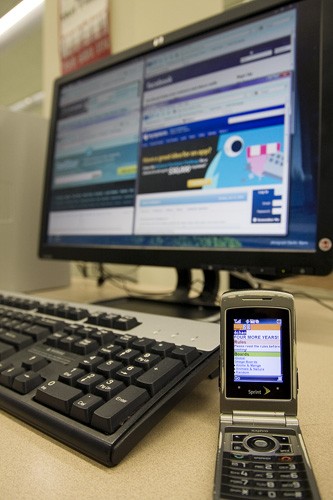Two UA professors are part of a new $1.1 million federal grant project to research practical and defense applications of social networking.
For most, social networking seems relatively new and rather frivolous, with social networking sites used to strengthen pre-existing social ties as much as, if not more than, to forge completely new ones.
Brint Milward, director of the UA School of Government and Public Policy, and Ron Breiger, a UA sociology professor, are working on the project with faculty from the University of Maryland and State University of New York, Albany.
The grant covers research on covert and violent international networks from public records, Milward said.
Social networking reaches far past just the use of Facebook, Twitter, MySpace or LinkedIn: it is a pattern in which humans have been participating for centuries. It’s the interactions of people, utilizing trust and reciprocity to provide advantages for those within them.
“”Facebook is just the application of a social network,”” said Keith Provan, a UA professor of management and organizations.
This research is complementary to what the dozens of social network analysts have been doing on the UA campus for the last couple of years, spreading through departments such as anthropology, computer science, political science and sociology.
The placement of remnants of ceramics and obsidian volcanic glass shows that 500 years ago, people were still getting event invites, but they were to communal dinners and trading posts, not late night bashes, said Barbara Mills, director of the department of anthropology and part of UA’s social network analysis team.
“”It’s not random, it’s not by chance,”” Mills said, noting that these exchanges are ancient markers of social connections, much like Facebook invites or friends lists would provide insight into our social interaction.
Breiger, Milward and others are taking research like this and studying just how purposeful human participation in social networks is today.
“”Human beings are relational,”” Breiger said. “”The whole interest in social networks is that they are networks about the context in which they are embedded.””
Breiger started working on social networking analysis in the 1970s and has studied the strength of weak ties, a theory which promotes moving beyond a closed social network in order to gain new knowledge through acquaintances, as well as how face-to-face interaction bolstered by humor can strengthen bonds within an existing social network.
All of these endeavors have given Milward and Breiger perspective on how to apply human patterns of networking to covert operations today.
Joseph Galaskiewicz, a UA sociology professor, is admittedly not a Facebook user, but notes that a modification of it could help the future of social networking.
Galaskiewicz believes a localized Facebook-type system could support student retention by providing a closed network, as well as help researchers understand how a new generation socializes in a technology-driven world in a specific case study.
“”There are mixed forms of face-to-face versus technologically mediated (contact) … but there’s a personal element you are never going to replace,”” Milward said.
Provan noted that the evolution of social networking will take place on both an interpersonal and organizational level, with local governments taking cues from international models in Japan and the Netherlands.
Provan said he believes that the evolution of social networking is dependent upon the research that people like the group of UA professors are doing to help everyone understand just what social networking can do.









